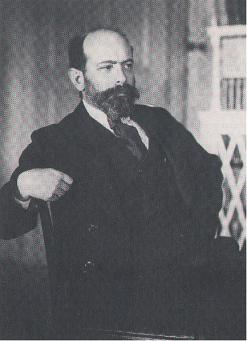Paul Cossmann
German writer, editor, and publicist (b. 6 April 1869 [N.S.] in Baden-Baden; d. 19 October 1942 in Theresienstadt), born Paul Nikolaus Cossmann.
He was the son of the cellist Bernhard Cossmann (1822–1910) and his wife Mathilde (née Hilb). The elder Cossmann had from 1866 to 1870 taught at the Moscow Conservatory (where Tchaikovsky was his colleague) before he decided to return to Germany with his family. They had settled first in Baden-Baden, but in 1878 they moved to Frankfurt am Main, where Bernhard Cossmann became one of the co-founders of the Hoch Conservatory.
In 1889, while in Frankfurt, the second stop on his itinerary through Germany, Tchaikovsky met the elder Cossmann at rehearsals for his concert, and the composer was invited to dine with his former colleague later that evening. The two men had evidently not met since Cossmann's departure from Russia in 1870. An entry in Tchaikovsky's diary for 2/14 February 1889 reads: "Dinner at Cossmann's. He has aged awfully. Pleasing wife and daughters. [...] Home. Unpleasant realization of failure. At Cossmann's. Supper. Their warmth and kindness" [1]. Despite some problems at that day's rehearsal and his misgivings about the conservative Frankfurt audience, Tchaikovsky's concert the following day, on 3/15 February 1889, at which he conducted his Suite No. 3, turned out to be a huge success. He left Frankfurt already the next morning to travel on to Dresden (where he gave another concert before Berlin), but the Cossmanns had seen him off at the railway station, and it is likely that they told him that their son, Paul, was studying in Berlin, and asked him to get in touch with the young man, which he duly did while in the German capital on 15/27 February that year. Tchaikovsky also corresponded with Paul's older sister, Lulu Cossmann, who became a schoolteacher.
After his studies, Paul Cossmann would go on to become an influential publicist, founding, in 1904, the Munich-based Süddeutsche Monatshefte. In this journal he would, among other things, champion the music of his lifelong friend, Hans Pfitzner (1869–1949), the composer of Palestrina. (Pfitzner, incidentally, was born in Moscow, where his father worked as a violinist in the orchestra of the Bolshoi Theatre before returning to Germany.) After the First World War, Cossmann, who had converted to Christianity in 1905 (both his parents were Jewish), espoused increasingly conservative and nationalistic causes, in particular the so-called 'Dolchstoßlegende' (stab-in-the-back legend) which attributed Germany's defeat in the war to sabotage by socialists, Bolsheviks, Jews, and other dissidents within the country. When the Nazis came to power in 1933, however, Cossmann's staunch opposition to them led to his being arrested by the Gestapo that year. Although subsequently released, thanks to the intervention of Pfitzner, he was arrested again in 1938, before being finally deported to the Theresienstadt concentration camp in 1942. He died there of typhus in October of that year, and was remembered by the inmates who survived for his generosity and willingness to help others.
Correspondence with Tchaikovsky
One letter from Tchaikovsky to Paul Cossmann has survived, dating from 1889, and has been translated into English on this website:
- Letter 3793b – 13/25 February 1889, from Berlin.
External Links
Notes and References
- ↑ Diary entry for 2/14 February 1889. Here quoted from The Diaries of Tchaikovsky (1973), p. 258.

